Soldier’s Poetry
-
The following poems have been copied from many sources, where known the author has been indicated. They are poems of particular significance to the men of the 2/4th Machine Gun Battalion and to the families and friends they have left behind. Many of the poems were first published in the Battalion’s postwar ‘Borehole Bulletin’.
Great Love Hath No Man – Darwin 1941 … by Major Alf Cough, CO Don Coy. 2/4th MGB. Forwarded to us by Lauraine Cameron, daughter of Colin Cameron. This poem is mentioned in ‘Ghosts in Khaki’ P58.
Those Young Dorizzi Boys … by Chris Taylor
- The Poppy … by John McCrae
- Mates … by Duncan Butler 2/12th Field Ambulance
-
To A (WX) Mother … by Pte Frank Collins NX32561 – this was sent to Ted Hopson’s mother. Ted died of illness in 1944 Sumatra.
- Please read further about Ted Hopson
- Free Again …by Cpl. G.W.Wills 8048958 US Army
- Fifty Years …by ‘Slim’ Pitts WX7626, 2/4th MGB
- No More Letters Home a contempoary poem by Chris Taylor
- Singapore … by Dame Mary Gilmore
-
The Fate of the Second Fourth …(probably written in Darwin) writer unknown.
-
Our Departed Comrades …by Ted Murtagh WX10792 2/4th MGB (Green Force working on the Burma end of the railway.)
-
The Darwin Lament – 2/4 MGB, AIF – Abroad, Malaya 24/1/1942 … by Lt. G A Raphael, executed 19/2/1942 by Japanese Imperial Army.
-
Remembrance … Major Alf Cough 2/4th MGB for first Parade of 2/4th, March 1942 Changi, Singapore.
HILL 200 – the fighting at Hill 200, Ulu Pandan resulted in many 2/4th deaths and wounded. Mick Anketell was wounded and later died in Hospital.
In December the Japanese finally granted permission to Cough to return to Hill 200 in an attempt to identify the dead and recover personal items. He took a party of POWs on about 17 December. They were bitterly disappointed to confirm the Japanese had buried their own dead amongst the bodies of the Australians soon after Surrender. The Australians had been left to the tropical weather, elements of Singapore and wild animals including wild pigs. They were only able to identify a few men and managed to erect a cross on the top of Hill 200.
Cough wrote this poem in his diary on 20 December 1942 whilst a POW at Sime Road, Singapore.
This ‘Jingle’ is copied from Inland Watch (Leonora) Saturday, 24th June 1939
NON STOP JINGLE – ‘THE RED TERROR SUBDUED’ (BY “BURRUM”) – An entertaining poem describing the journey by vehicle with a competing cycle team on board, travelling to Menzies. (Remember few private vehicles were owned at that time – who knows what the ‘Red Terror’ was – I have visions of an outdated Fire Truck! ). 2/4th’s Doug Hampson is mentioned.
________________
‘Georgie/Nautical mite’ is none other than George Gwynne.
John – is unknown!
___________________
SANDAKAN by Bill Gordon
I grew up hearing stories of the prisoners of war who worked on the infamous Thai – Burma Railway. What I did not hear about, what no one heard about, was the prisoners of war were sent from Changi to North Borneo. Those who survived the rigours of Sandakan were sent on a death march to Ranau, where those who did not die on the way were ultimately massacred by the Japanese.
This chapter of our history was kept secret after the war, and relatives of those POWs had to wait 30 to 40 years before learning what actually happened to their loved ones.
This poem is a reflection of my visit to Sandakan in April 2010.
_____________________


—————————————————————————————
Those Young Dorizzi Boys
Three brothers joined to fight the war, three brothers and a friend,
With no idea of where they’d go or when that war would end.
These boys were the Dorizzi brothers, Gordon, Bert and Tom
And Toodyay was the country town these brave young men were from.
Their friend was Reggie Ferguson, who signed up with his mates
To fight against the Japanese, prepared to meet their fates.
Their country needed soldiers to help even up the score,
So our four boys from Toodyay town marched off to join the war.
Tom had a wife and daughter, Reggie had two girls as well,
And who could know how hard it was to bid them all farewell.
And other towns across the state with men of fighting age
Would send their sons away to be a line on history’s page.
With other West Australians off to training camps they went
As soldiers of the 2nd/4th Machine Gun Regiment.
Then onto ships and sailing to another foreign shore,
Our 2nd/4th machine guns would be sent to Singapore.
This tiny island nation was important for Japan.
A step toward Australia it was vital to their plan.
Malaya had been taken, they had Singapore in sight.
The 2nd/4th Machine Guns were now thrown into the fight.
Along with other forces they put up a grand defence.
For one long month they held against fierce Japanese offence.
The enemy were far too strong and captured Singapore.
Our Dorizzi boys and Reggie were now prisoners of war.
Some men were sent to Changi for the Burma Thailand rail
To suffer new brutality of monumental scale.
But our boy’s fate would be much worse, they’d suffer to a man.
Our four young lads from Toodyay town were sent to Sandakan.
They had to build an airfield for the Japanese Air Force
And knew they would be there until the war had run it’s course.
But our brave men would not forget what they were fighting for.
Defence of Home and country was their purpose in this war
One thousand young Australian men were sent to Sandakan,
And each one to a soldier was worth ten of any man.
They suffered from starvation and were worked until they dropped.
They beat them if they faltered and they shot them if they stopped.
But when the allies dropped their bombs the prisoners all cheered.
The airfield was beyond repair before the smoke had cleared.
And our four boys from Toodyay town cheered too at what they saw,
They knew though they were prisoners they had not lost the war.
The Japanese were beaten so they fled from Sandakan
And forced our men before them as their final march began.
One sixty miles through jungle growth they marched toward Ranau.
Through three long years as prisoners, their fates were final now.
We cannot know of their last thoughts, or how they might have passed,
But hope they knew salvation as they found relief at last.
One thousand of our finest men, all prisoners of war,
Yet only six Australians would make it home once more.
For Gordon, Bert and Tom and Reg their fight was not in vain,
But all their friends and family were left to feel the pain.
The 2nd/4th Battalion still revere the men they lost,
But only those brave men could know what freedom truly cost.
So let us not forget they sacrificed all they could give
So you and all Australians could have the life we live.
Three brothers and a mate who will be coming home no more,
They lost it all in Sandakan when they went off to war.
C.J.Taylor


—————————————————————————————-
The Poppy
————————————————————————–
Mates … by Duncan Butler 2/12th Field Ambulance
I’ve travelled down some lonely roads,
Both crooked tracks and straight.
An’ I’ve learned life’s noblest creed,
Summed up in one word … “Mate”.
I’m thinking back across the years,
(a thing I do of late)
An’ this word sticks between me ears;
You’ve got to have a “Mate”.
Someone who’ll take you as you are,
Regardless of your state,
An’ stand as firm as Ayres Rock
Because ‘e is your mate.
Me mind goes back to ’42,
To slavery and ‘ate,
When man’s one chance to stay alive
Depended on ‘is Mate.
With bamboo for a billy-can
An’ bamboo for a plate.
A bamboo paradise for bugs
Was bed for me and “Mate”.
You’d slip and slither through the mud
And curse your rotten fate,
But then you’d ‘ear a quiet word:
“Don’t drop your bundle Mate.”
And though it’s all so long ago,
This truth I ‘ave to state:
A man don’t know what lonely means
Til ‘e has lost his “Mate”.
If there’s a life that follers this,
If there’s a Golden Gate,
The welcome I just want to ‘ear
Is just, “Good on y’ Mate.”
An’ so to all that ask me why
We keep these special dates,
Like “Anzac Day” …
I answer: “WHY??! – We’re thinking of our MATES.”
An’ when I’ve left the driver’s seat,
An’ handed in me plates,
I’ll tell ol’ Peter at the door,
“I’ve come to join me Mates.”
—————————————————————————————
To A (WX) Mother … by Pte Frank Collins NX32561
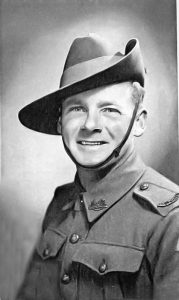

Hopson successfully escaped from Singapore to Sumatra around the end of fighting, Feb 1942. He was taken POW by Japanese in early March 1942 and imprisoned Gloegoer POW Camp. He was one of about 100 Australians. Others from 2/4th also captured in Sumatra included Annear, Squance, Burgess, Semple, Magill, Harold Smith and Quinn.
—————————————————————————————-

———————————————————————————–
Fifty Years … by ‘Slim’ Pitts WX7626
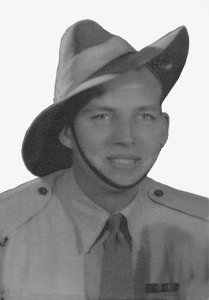

—————————————————————————————
No More Letters Home … by Chris Taylor
“Hello Mum” the letter started, just like the ones she’d read before
And she reads them once or twice a day since her son went off to war.
She doesn’t get them often now because they come from far away
Still, she sits on her verandah and waits the postman every day.
Hoping with her every prayer there’ll be more letters home.
To his father he’s a digger and the family pride and joy
But to her he’s not a soldier, he’s just her handsome grown up boy
She’d pleaded with him not to go, “Please just stay and work the farm”
She feared that even with her prayers her boy might come to harm.
And then she knew there’d have to be no more letters home.
But no matter how she pleaded, she could never change his heart
And stood there watching through her tears to see her boy depart
He had written lots of letters in those first few months away
But the time between grew more and more and he had less and less to say.
And she worried it would all too soon mean no more letters home.
This letter had come weeks ago but from where she didn’t know.
He rarely told her where he was or the places he might go
But he asked after the family and the friends he left behind
And told her of the newfound mates that he’d been blessed to find
And she hoped that all these newfound friends had sent their letters home.
He promised her as always that he was fit and doing fine
And that so far all the fighting was much further down the line.
She knew of course that wasn’t true, as mothers always know
But she loved him for the little lie and simply let it go.
Still praying there would always be more letters coming home.
She glanced up from her letters when the knock came on the door
And looked out through the window as she walked across the floor.
At the military vehicle that had been parked out on the street
And her mind began to scream, her heart began a stronger beat
They had finally come to tell her there’d be no more letters home.
She paused a moment at the door as the tears began to rise
Then bravely called on all her strength and with her apron wiped her eyes.
She thought about her husband and wished he could be here
To hold her, just to hold her and help her face the fear
Instead she’d have to tell him why there’d be no more letters home.
She opened up that heavy door and stood there frozen into place
And saw the soldier standing there with his worn and weathered face.
He stood a little awkward on the crutch that him walk
But she recognised his smile as soon as he began to talk
“Hello Mum, my war is over, so there’ll be no more letters home”.
—————————————————————————————-
Singapore … by Dame Mary Gilmore
Dame Mary Gilmore, recognised for her services to Australian literature, wrote a pretty fiery poem, March 1942, on the fall of Singapore. Read her poem Singapore .
—————————————————————————————-
The poem below was printed in ‘Borehole Bulletin’ July 1990.
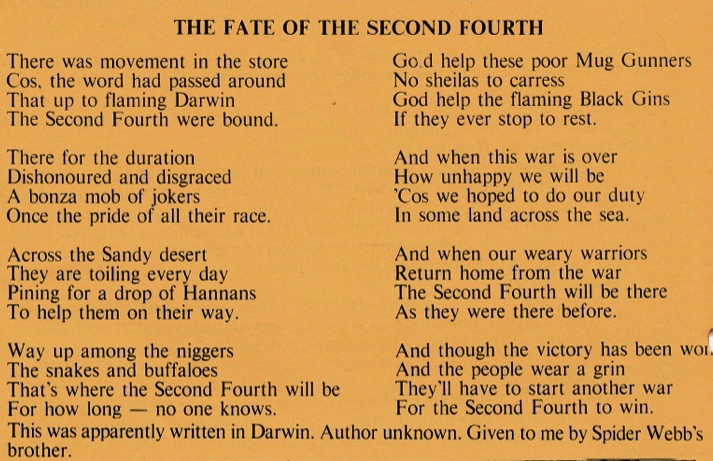
—————————————————————————————-
Our Departed Comrades
In the depths of southern Burma
Our departed comrades lay
Their grave there, marked by crosses
Beside the railway stay.
To make the hellish passage of those
Who passed that way.
They toiled, starved and suffered,
Our captors did not care
If we had no food or medicine
To fight disease with there
And when there came a small amount
They had the lion’s share
The doctors fought their hardest
And did their level best
To bring them through the darkness
To keep life in their breasts
But they went on their journey
And we left them there to rest
Comrades, left behind out there,
In our hearts will be
Your memory, till our race is run
And we meet up there with thee.
The above poem was written by Ted Murtagh, who worked on the Burma end of Burma-Thai Railway with ‘A’ Force Burma, Green Force No. 3 Battalion, it was supplied by his daughter to 2/4th and included in Borehole Bulletin January 1999.
Please read about Ted’s movements as a POW.
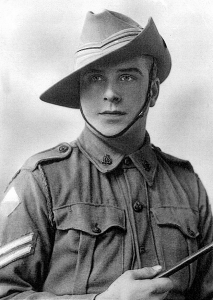
—————————————————————————————-
THE DARWIN LAMENT
The Colonel’s brow was sad, the Colonel’s brow was low,
A thinking of the 2/4th and where they ought to go,
‘Cos they were down in Woodside and he had had enough
Of getting around in overcoats and sweaters and in muffs.
So he called to him his Adjutant, and said “I’ve got it son,
We’ll take em up to Darwin, there’s work there to be done,
They say the climate’s nicer there and sun shines all year,
It may be hot, but never mind, we’ll have ice in our beer”.
Then he asked the mob quite nicely “Now who’ll come with me,
North to flaming Darwin, to keep me company”.
The mob they didn’t like it much, but said they’d stick around,
‘Cos why he was their Colonel, they couldn’t let him down.,
Up we comes to Darwin, by railway and by truck,
We knew before we saw the place that we were out of luck,
The ruddy heat was terrible, we lost weight by the stone,
And what was left the sandflies ate, we were never left alone.
But now we’re getting used to it, the flamin’ rotten place,
Tho’ as to us a likin’ it – that just ain’t in the race.
And now that we’ve got settled down and got a bit of push
They send us out a-building roads along the ruddy bush.
But if we think we’re wanted here, we’ll stick it, never fear,
The people may feel safer now the 2/4th are are here,
And when we’ve built their flamin’ roads
And kept the Japs from Darwin,
We’ll maybe get a few days leave – to breast the ruddy Bar-in.
So now you blokes who moan a lot,
Just listen to this poem,
And thank your lucky stars you’re here
To help the Choco’s guard your home.
The above poem was included in July 1990 Borehole Bulletin having had earlier requests for somebody to send to the Editor.
The Author is unknown.
—————————————————————————————-
2/4TH AIF ABROAD, MALAYA … By Lt. G .A. Raphael, WX3447 – Intelligence Officer, Battalion HQ, 2/4th Machine Battalion. Written ‘Abroad, Malaya, 24/1/1942’
Geoff Raphael was executed by the Japanese after capitulation.
Major Green’s report states
‘Captain Thompson, Lieutenant Raphael and Private Brown were with the unit at Buona Vista on 15th February 1942, the date of the capitulation of Singapore. On the 16th a portion of the unit was moved to Holland Village and thence to Raffles College Square. During the afternoon of the 16th whilst we were concentrated at Raffles Square a Japanese soldier entered the square and ordered Captain Thompson, Lieutenant Raphael and Private Brown (who were standing at the end of a column) to accompany him. They were marched to the roadside where they were placed on a truck’.
It is believed that these men were questioned on the Monday, Tuesday, and Wednesday and on Thursday 19th February, at 1715 hours were executed with their hands tied behind their backs.

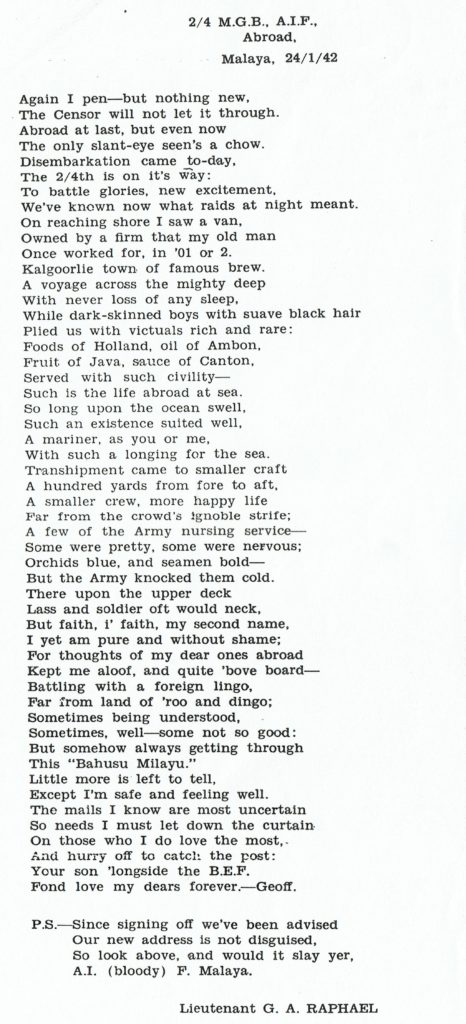
—————————————————————————————-
REMEMBRANCE … By Major Alf Cough, 2/4th MGB. Written for first parade of 2/4th March 1942 at Changi, Singapore. It was read at the 2000 Fall of Singapore Service, POW Memorial, Kings Park organised by John Lane (previously known as Ramsbottom).
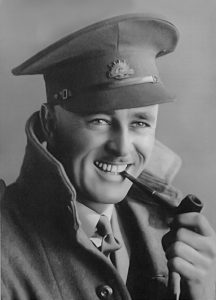


HILL 200 by Major Alf Cough on his return from a search party from Sime Road to recover bodies.
HILL 200
Hill 200 – just one of so many
That were scenes of action and death
Raked and torn by screaming destruction
Which came with the War’s scorching breath
Deep wounds in the green of the hillside
Gaped wide where the red soil upturned
Ran like blood, thru the bracken that withered
Neath that breath which blistered and burned.
Hill 200 – now peaceful and quiet
Few signs of the battle remain.
The red wounds are covered by nature
With green; and the wind sighs again
Thru the bracken, its roots ever searching
For life in the red soil below,
Mingling there in the bones of our comrades
Who Sleep. Never old will they grow.
A plain wooden cross on that hilltop –
Overlooking a peaceful terrain
The scene of the last gallant action
They fought and died for in vain –
Marks the last resting place of comrades
Who fell neath the beneath the foeman’s glaive
Death is their portion, with Glory
And honour – the reward of the brave.
Written at Syme Road, Singapore
20th December 1942
Please read the story of Hill 200, Ulu Pandan
—————————————-
Inland Watch (Leonora) Saturday, 24th June 1939
NON STOP JINGLE
THE RED TERROR SUBDUED (BY “BURRUM”)
T’was early one Sunday morning
When the Cycle Club boys turned out
For a journey to little old Menzies
To compete in a twenty-mile bout.
There was Tedgrie, Gillett and Latto,
Trembath, Ted Ward and the Sec.
Six of ‘ers in the “Red Terror,”
Each one risking his neck.
The driver was reckless and risky,
The pace was on from the start,
The Terror seemed frightfully frisky
As if bent on doing her part.
She coughed, and barked, and backfired
Whenever a hill hove in sight,
But she flew down the slopes like a devil
inspired,
T’was a really remarkable flight.
Eventually Menzies was sighted
From the passengers rose up a cheer;
I believe young Tedge was heard to remark
“Lord struth, it’s a fact boys, we’re
Here.”
So then, with the long journey over,
To breakfast the boys all adjourned,
When Ted found a nail in the butter,
“Tis an omen, an omen” he mourned.
“There will be punctures, and punctures,
And punctures
Before this Sunday is done.”
So, the lads felt a little disheartened
And the look on their faces was glum.
Small troubles like these were forgotten
As the starters wheeled up to the line,
Where Jack Allan was showing the trophy,
A gold wrist watch, very fine.
“They’re off and away,” cried the large
crowd that day
And the race was a beaut from the Start,
But our boys had to stop, as their tyres
went pop,
And it all but broke the Sec.’s heart.
However the sport must continue,
For the limit men had a good lead
And the scratch men were riding like hoboes.
In need of a good feed.
And Harry, the solid old plugger
Was going great guns in the front
While Ossie, the “Rat” and Doug Hampson
Were flat out to catch the old runt.
Down there at night the winner looks easy
And the crowd gave voice to a cheer
As Harry Pianti bright and breezy
Sailed over the line without fear.
Alf Hince, a trier, was second
Then the scratch men came all in a bunch
But Ossie slipped out and ended the doubt
While the Rat’s teeth went scrunch-a-
de-scrunch.
With the race well won and the day almost done
Our boys turned again towards home
But they hadn’t gone too far when they struck
a sand bar
And the Terror decided to roam.
To the scrub like a timid young turkey
She flew midst a squealing of brakes
While a tyre blew out, setting hopes all to rout
When she settled on some stakes.
Repairs were at this stage effected
And homeward they set off again
While the tubes now barely protected
Were protesting under the strain.
Bang went another good tyre
Before many miles had been passed
So the boys lit a great camp fire
In case they were there till late.
And so I could go on forever
With tales of the lads’ sorry plight
Till they pulled up at last with despair in their hearts.
Decided to camp for the night.
The “Scrub Turkey” – in other words Ted
Was earliest up from his bed
To battle away at the start of the day
On the Red Terror’s obstinate tread.
However, towards lunch time a traveller,
Came sailing into view,
So the boys up and stopped him, then all
promptly hopped in,
Leaving their car in stew.
“Home James, and don’t spare the horses”
Was the outspoken heartfelt request.
____________________________
MAJOR CYRIL WILD WAS A JAPANESE SPEAKING BRITISH OFFICER
Major Wild was the man who carried the white flag of surrender walking beside Lt General Percival at the surrender in Singapore.

British force surrendering to the Japanese on Feb. 15, 1942, led by Lieutenant General Arthur E. Percival on right, with left: Major Cyril Wild (carrying white flag) interpreter; Brigadier T. K. Newbigging, chief administrative officer, Malaya Command; Japanese Lieutenant Colonel Ichiji Sugita, Brigadier K. S. Torrance, Malaya general staff command.
He was also the official British interpreter when the Crown Colony was officially handed over to General Yamshita at the Surrender.
The following poem was written by Colonel Wild when in a POW Camp at Sonkurai, Northern Thailand with ‘F’ Force. An epidemic of cholera had broken out and hundreds of POWs died, a large number being British and Australian, but an even larger number were local coolies who, it is said, were the first to contract the disease.
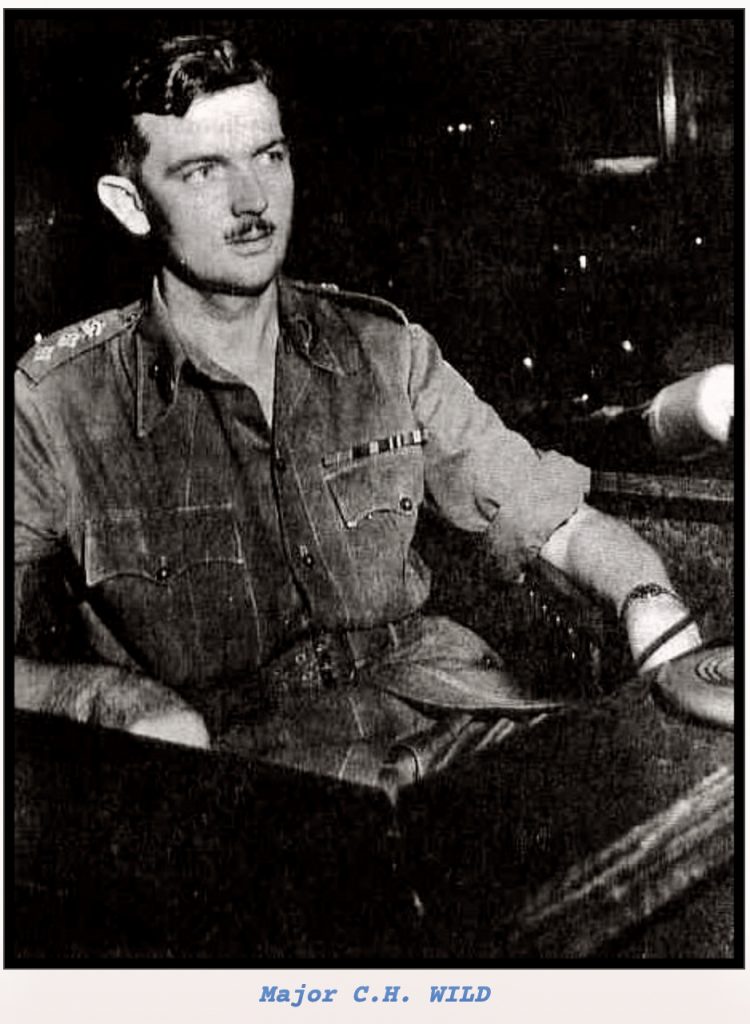
Above: Major Cyril Wild was interpreter to overall commander of ‘F’ Force, Thailand Lt. Col S Harris, Commander of the British 18th Division area at Changi.
Lt. Col G Kappe, Headquarters 8th Division Signals was commander of the 3,666 Australians of ‘F’ Force
At Sonkurai
At Sonkurai where hope lay drowned
Beneath the bridge the earth is browned
With mould and monsoon vapours veil
The jungle and the creepers trail
Like snakes inert their coils unwound
And there our rear-guard kept their ground
Eight comrades laid beneath each mound
A thousand dead without avail
At Sonkurai
Freed from the captive’s weary round
Homeless, a lasting home they found
Let not our faith their courage fail
‘Til with the dawn the stars turn pale
And, silent long, our bugles sound
At Sonkurai
Wild was again present nearly four years later in 1945, when Japanese General Itagaki unconditionally surrendered to Lord Louis Mountbatten.
In the intervening years, Wild, along with thousands of other British servicemen, had been a prisoner of war, during which time they were subjected to brutal mistreatment by the Japanese.
Wild used his Japanese language skills to great effect, frequently interceding on behalf of his fellow POWs. So tireless were his efforts that the Japanese referred to him as nemuranai se no takai otoko (the tall man who never slept).
The horrors he had witnessed made Wild determined to bring his former captives to justice when the war was over, when once again his ability to speak Japanese was a valuable asset, allowing him to interrogate an number of high ranking Japanese officers prior to the Tokyo War Crimes Tribunals, at which he was a key witness. He was actively engaged in this work when, in 1946, he was killed in an air crash, which many believe was no accident.
After the war, he was sent back to Singapore, with the rank of colonel, as a Crimes Liaison Officer with ALFSEA. Went to Tokyo to give evidence in Sept 1946 but returning back to Singapore, he was killed in a plane crash in Hong Kong on 26 Sept 1946.
On 25th September 1946 a Dakota KN 414 crashed two minutes after take-off. On board was Colonel Wild.
Several days before his death, Colonel Wild had made it known to the American Authorities, via Generals MacArthur and Willoughby that he had acquired enough evidence to be able to convict Emperor Hirohito of War Crimes (including bacteriological warfare experiments).
Colonel Wild had been ordered to cancel any further work in this direction and to hand over all the documentation he had so far accumulated. The air crash, in which he was killed, happened at Kai Tak, Hong Kong as he returned from Tokyo after giving evidence at the War Trials on the atrocities committed against the POWs.
All of the above about Major Wild we acknowledge is from COFEPOW – https://www.cofepow.org.uk/armed-forces-stories-list/a-report-of-f-force-in-thailand
‘Colonel Cyril Wild, who had reported on the conditions suffered by the “F” Force (extracts mentioned in the article above), found himself in a singular position in the months following the Japanese surrender.
‘Although still not fully recovered from his own ordeal after three and half years as a POW, Wild did not give himself up to the longed-for journey back to England. He remained in Singapore to use his incalculable knowledge and experience during the primary work of starting the war crimes investigations
He was given the task of tracking down all Japanese, whatever rank, who had carried out atrocities against prisoners of war and to whom charges could be laid in respect of war crimes.
Being fluent in Japanese was a great advantage to Wild in his investigations as he was able to discover, through personal interrogations, the truth about many atrocities which might well have remained a mystery for ever. But he also bore the personal scars of one who had suffered much at the hands of the Japanese while with “F” Force and consequently he carried a great determination to see that justice was done.
Wild was therefore in a very unique position. He was a first class interpreter, as his investigations progressed he became a ruthless interrogator and his own experiences made him a first-hand key witness.’
https://forum.axishistory.com/viewtopic.php?t=86518
____________________
SANDAKAN
The air is warm and still, up my spine that runs a chill
As we enter through the gates at Sandakan.
Here we come on ANZAC Day, honour those who had no say,
This place was hell on earth for every man.
Through the ghostly pre-dawn light, in my mind a glimpse of sight
Of the camp here in those darkest days of war.
Those spirits come assailing, the courage yet failing,
Brave wretched souls who walk this earth no more.
Forced here to do a task, and exhausting thankless ask,
To build an airfield for the Japanese.
Daily brutally assaulted, the courage never faulted,
They lived and worked in squalor and disease.
They had heard Australia’s call, “We need you one at all,
For King and Country rally to the cause.”
Young men without a care, men of chivalry and flair,
Signed up to go and fight another’s war.
Sailed off without a fear, while their mother’s shed a tear,
They’d seen it almost 30 years before.
Another time, another place, another enemy to face,
Now their sons were heading off to Singapore.
A fortress strong and true, no chance of breaking through,
Our men were safe behind those giant guns.
The Japs had another plan, they stormed in overland,
Took all before them, and Australia’s sons.
Men were given no respect, with contempt and with neglect
They were starved and flogged and treated just like swine.
The plans at all been made, no care what price was paid,
An airfield for the Emperor and have it done on time.
Death and sickness everywhere, the captors did not care
How many fell while getting this job done
With ulcerated legs, no heeding to their begs
For mercy as they toiled beneath the sun.
Men reduced to skin and bone, with every rib now shown
And their rice allowance once more cut in half.
Delirious and abused, Red Cross medicine refused,
Forced back to work, the Japs could only laugh.
So many men are died, the liberty denied
They filled the swamp and levelled off each mound
Still they laboured day by day, a cup of rice pay
With failing strength they built the landing ground.
The tide of war must change, the Japs now acting strange,
There’s a sense of panic in their every move,
At last they’re showing fear, they know their end is near,
But they aren’t finished yet, the dominance to prove.
On that God-forsaken track, a bag of rice upon each back,
Weak men struggled on a march to who knows where.
Somehow they reached Ranau, today we question how,
While the beatings kept on coming, their captors did not care.
None would be left alive, not a single soul survive,
To tell the world what slaughter happened here.
Escape right now they must, in providence to trust,
Some allied soldiers surely must be near.
That six men did survive, made it out of there alive,
A miracle they made their homeland shore.
Mates who lay along the track, a bullet in the back,
No chance for them to even up the score.
The price of war is paid by men whose bodies laid
Forever in some far-off foreign land.
Men who made it home, but daunted, with mind and body haunted
By the horrors of the hand of fellow man.
All we who were not there, the sufferings to share,
How can we ever hope to understand.
But let us remember yet, never ever to forget
What happened at a place called Sandakan.
Written by Bill Gordon – 8. 9. 2014
______________________________________________


